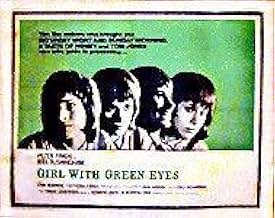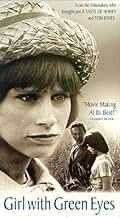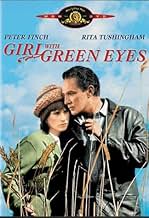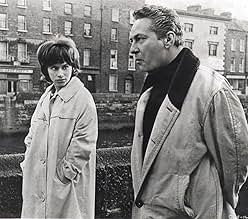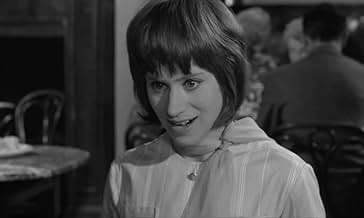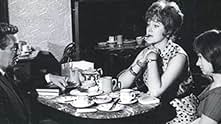VALUTAZIONE IMDb
6,9/10
1600
LA TUA VALUTAZIONE
Aggiungi una trama nella tua linguaIn 1960s Dublin a young girl becomes involved with an older man, a much-travelled and still-married landowner.In 1960s Dublin a young girl becomes involved with an older man, a much-travelled and still-married landowner.In 1960s Dublin a young girl becomes involved with an older man, a much-travelled and still-married landowner.
- Nominato ai 2 BAFTA Award
- 3 vittorie e 3 candidature totali
Marie Kean
- Josie Hannigan
- (as Maire Kean)
Liselotte Goettinger
- Joanna
- (as Lislott Goettinger)
Pat Laffan
- Bertie Counham
- (as Patrick Laffan)
Michael C. Hennessy
- Davey
- (as Michael Hennessy)
Joseph O'Donnell
- Patrick Devlin
- (as Joe O'Donnell)
Michael O'Brien
- The Lodger
- (as Micheal O'Briain)
David Kelly
- Ticket Collector
- (as Dave Kelly)
Recensioni in evidenza
Long into watching this studiously "small," slice-of-life portrait of a naive young woman, I was still wondering if the film would turn out, in the end, to have been worth watching. Earnest in its desire to be grittily true-to-life, in the neo-realist manner of the Angry Young Men, it is also clearly intoxicated with the quotidian lyricism and plain-spoken poetry of la nouvelle vague. It attempts to be charming and brutally frank at the same time, and manages, to some extent, to carry it off.
But will we end up caring about Tushingham's somewhat obtuse small town escapee, or Finch's sophisticated cold fish? Or will we be left with the rather sodden sensation that we've wasted our time eavesdropping on bores? For my part, I was pleasantly surprised. The story ends with the palpable sense that Kate has grown up a bit, and Eugene has grown a little older and sadder. We've looked on as two people have lived their bittersweet lives, much as we live our own -- and we're a little sad to bid them adieu.
To sum up: not as fresh and appealing today as it probably seemed in its time, but still rewarding and worthwhile.
But will we end up caring about Tushingham's somewhat obtuse small town escapee, or Finch's sophisticated cold fish? Or will we be left with the rather sodden sensation that we've wasted our time eavesdropping on bores? For my part, I was pleasantly surprised. The story ends with the palpable sense that Kate has grown up a bit, and Eugene has grown a little older and sadder. We've looked on as two people have lived their bittersweet lives, much as we live our own -- and we're a little sad to bid them adieu.
To sum up: not as fresh and appealing today as it probably seemed in its time, but still rewarding and worthwhile.
Girl with Green Eyes seems typical of the period of British "Kitchen-Sink" drama films (I saw it as the 2nd part of a double bill with The Leather Boys and the theme being Rita Tushingham performances, though this is dialed down a little from that turn), and that's what's good but not terribly memorable about it all. It's realistic in some of the basic character interactions, though it has a bouncier/more emotionally-cued up score than the material should have, if that makes sense. It seems like a minor point but Desmond Davis clearly wanted to get a lot of emotional/romantic/tragic pull out of the music by John Addison, and it may have been too much for this lot of realism (how typical this is by the way, it's produced by Tony Richardson).
The story is actually an Irish-Kitchen-Sink movie, though with a couple of British touches: a young girl in Dublin, who originally was from a fairly lower-class farm that was highly religious but working *very* Irish class all the same, is working at a bookstore and finds that there's an author that she would like to meet along with her friend/roommate Baba. Peter Finch is this man, and soon Kate, the girl of the title, takes a real liking to him, and after not too long he to her. So they "hook up", so to speak, and this brings on problems, both external in force (he's technically married with a kid in another country, she's got pressure from her family not to have anything to do with this "Godless heathen), and more about the fact that it's a man who could be old enough, if only barely, to be her father.
This is a story explored in many kind of films, whether it's throw-a-dart-and-hit a Philip Roth story, or of course Manhattan. There's enough chemistry and charm between the two leading people as Tishingham, even dialed down, is delightful, and Finch does a lot playing usually-crusty and mostly sardonic/sarcastic speaking (if there had been a remake some years back I could've seen Alan Rickman in his role), plus Lynn Redgrave being wonderful and funny in her supporting place. But there's not much here that elevates it past its time and place; it's a perfectly fine drama, and it doesn't distinguish itself past some insights, which are only insightful up to a point, that you may need to grow as a person (or can never meet the other on the flipside due to losing "youthful vigor" as an aging man) to have a relationship work sometimes.
There's a nice, tender feeling to the film, Finch and Tushingham make a good pair on screen (precisely because we kind of know, deep down, it's not only not going to work but it can't not ever work, if that makes sense, so let's see them in the little moments) and that should work for anyone looking for that. Although some things that contribute to the 'hasnt-aged-terribly-well' is, say, when the film is edited so early on in their courtship Eugene and Kate talk and one part of a sentence begins in a new location and then another and another, and it feels distracting.
The story is actually an Irish-Kitchen-Sink movie, though with a couple of British touches: a young girl in Dublin, who originally was from a fairly lower-class farm that was highly religious but working *very* Irish class all the same, is working at a bookstore and finds that there's an author that she would like to meet along with her friend/roommate Baba. Peter Finch is this man, and soon Kate, the girl of the title, takes a real liking to him, and after not too long he to her. So they "hook up", so to speak, and this brings on problems, both external in force (he's technically married with a kid in another country, she's got pressure from her family not to have anything to do with this "Godless heathen), and more about the fact that it's a man who could be old enough, if only barely, to be her father.
This is a story explored in many kind of films, whether it's throw-a-dart-and-hit a Philip Roth story, or of course Manhattan. There's enough chemistry and charm between the two leading people as Tishingham, even dialed down, is delightful, and Finch does a lot playing usually-crusty and mostly sardonic/sarcastic speaking (if there had been a remake some years back I could've seen Alan Rickman in his role), plus Lynn Redgrave being wonderful and funny in her supporting place. But there's not much here that elevates it past its time and place; it's a perfectly fine drama, and it doesn't distinguish itself past some insights, which are only insightful up to a point, that you may need to grow as a person (or can never meet the other on the flipside due to losing "youthful vigor" as an aging man) to have a relationship work sometimes.
There's a nice, tender feeling to the film, Finch and Tushingham make a good pair on screen (precisely because we kind of know, deep down, it's not only not going to work but it can't not ever work, if that makes sense, so let's see them in the little moments) and that should work for anyone looking for that. Although some things that contribute to the 'hasnt-aged-terribly-well' is, say, when the film is edited so early on in their courtship Eugene and Kate talk and one part of a sentence begins in a new location and then another and another, and it feels distracting.
Bitter sweet tale beautifully adapted for the screen by Edna O'Brien from her own novel. It is a difficult subject. a young girl's infatuation with an older married man but the dialogue is so good it even convinces when you initially feel that a scene is unlikely to work. Her inviting him out to tea, her opening his bedroom door are prickly moments dealt with so well they seem perfectly natural. Rita Tushingham and Peter Finch are perfect in their roles and director Desmond Davis' light touch in the first of a short run of successful films ensures that there is almost something magical now and again. Of course, such a subject would be controversial anywhere, anytime but early 60s Ireland it must have been very much a no, no and the film does not avoid this. Indeed it confronts the hypocrisy of family and church very well including a devastating eulogy from the local priest which absolves men from just about anything, except the matter in hand. You can take a girl out of a convent but not the convent out of the girl, is the ardent hope of these primitive souls but perhaps no more as recently uncovered horrors have exposed even greater hypocrisy and criminality in the name of the Lord. In the end the film says more about the making and keeping or changing friends (and lovers) and is a surprisingly insightful outing.
The only thing I had seen before this by Desmond Davis, was the classic "Clash of the Titans." That was perhaps the best movie ever made based on ancient Greek Mythology. It was a wonderful adventure and fantasy film.
This is totally different. It is British new wave with a camera that tracks, sweeps and runs across the British/Irish countryside as gently as it tickles Rita Tushingham's large nosed, perky face. Besides the energetic cinematography and editing which is somewhere between Goddard's "Breathless" and Richard Lester's "A Hard Day's Night," we get a hard edge slice of life drama/comedy that leaps with wit and poetry. Its as good as Tushingham's earlier, similar hit, "A Taste of Honey."
Lynn Redgrave is cuter than any human being has a right to be and Peter Finch is honest and likable as Eugene, the man who wins Tushingham's confidence, if not her heart.
The point of the movie is that we all change and we even "outgrow our friends". We should accept it without getting hysterical or dramatic about it. It is a touch sad, but we move on.
In a way it belongs with "My Fair Lady," and "Educating Rita" as a picture about women becoming...
All one can say about the movie in its entirety: "Smashing!"
This is totally different. It is British new wave with a camera that tracks, sweeps and runs across the British/Irish countryside as gently as it tickles Rita Tushingham's large nosed, perky face. Besides the energetic cinematography and editing which is somewhere between Goddard's "Breathless" and Richard Lester's "A Hard Day's Night," we get a hard edge slice of life drama/comedy that leaps with wit and poetry. Its as good as Tushingham's earlier, similar hit, "A Taste of Honey."
Lynn Redgrave is cuter than any human being has a right to be and Peter Finch is honest and likable as Eugene, the man who wins Tushingham's confidence, if not her heart.
The point of the movie is that we all change and we even "outgrow our friends". We should accept it without getting hysterical or dramatic about it. It is a touch sad, but we move on.
In a way it belongs with "My Fair Lady," and "Educating Rita" as a picture about women becoming...
All one can say about the movie in its entirety: "Smashing!"
It's just an episode but charmingly well done, Rita Tushingham shining with her eyes all through the film, well seconded by the slightly more reticent and laconic Peter Finch as the middle-aged writer with a failed family behind him and no illusions left, trying to be alone working by writing, which is difficult as Rita Tushingham keeps haunting him, and his family in America making themselves reminded by commenting on an aging man's relationship with a teenage girl with no experience - it could have been equivocal, but it isn't at all, since it is set in Ireland among angily bigotted catholics who also object against the unorthodox relationship and even try to do something about it by hard methods - there is some drama on the way. Lynn Redgrave assists Rita as well as she could and actually saves the situation in the end.
I saw this film when it was new, it was likeable enough already then, but made no lasting impression, wherefore I gave it a chance 50 years later just to refresh my memory and see what it really was all about - but it imported nothing new. It was still just an episode, charmingly well done, with the Rita's shining eyes and Peter's morose introversions - well done, indeed, but hardly universal, just local.
I saw this film when it was new, it was likeable enough already then, but made no lasting impression, wherefore I gave it a chance 50 years later just to refresh my memory and see what it really was all about - but it imported nothing new. It was still just an episode, charmingly well done, with the Rita's shining eyes and Peter's morose introversions - well done, indeed, but hardly universal, just local.
Lo sapevi?
- QuizIn the montage of the girls getting ready for their dates near the movie's beginning, the 45 r.p.m. record is "Fell In Love On Monday" by Fats Domino, who is also the topic of the magazine article near the record.
- Citazioni
Malachi Sullivan: Ah, the milk of human blindness.
- ConnessioniFeatured in Talkies: Remembering Dora Bryan/Our Dora (2019)
I più visti
Accedi per valutare e creare un elenco di titoli salvati per ottenere consigli personalizzati
- How long is Girl with Green Eyes?Powered by Alexa
Dettagli
- Data di uscita
- Paese di origine
- Lingue
- Celebre anche come
- La muchacha de los ojos verdes
- Luoghi delle riprese
- Wellington Monument, Phoenix Park, Dublin, County Dublin, Irlanda(Kate & Eugene and later Kate & Baba go there)
- Azienda produttrice
- Vedi altri crediti dell’azienda su IMDbPro
Botteghino
- Budget
- 140.000 £ (previsto)
- Tempo di esecuzione1 ora 31 minuti
- Colore
- Proporzioni
- 1.66 : 1
Contribuisci a questa pagina
Suggerisci una modifica o aggiungi i contenuti mancanti



